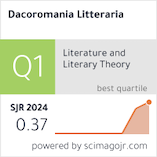CONSTANTINA RAVECA BULEU
BUCURA DUMBRAVĂ’S OUTLAW/ HAJDUK NOVEL
DOI: 10.33993/drl.2020.7.154.163
Author's coordinates: The Institute of Linguistics and Literary History Sextil Puşcariu, 21 Racoviţă Str., 400165 Cluj-Napoca, Romania.
Email: constantina.buleu@yahoo.com
BUCURA DUMBRAVĂ’S OUTLAW/ HAJDUK NOVEL
(Abstract)
The Robin Hood type of outlaw hero, as delineated by Eric J. Hobsbawm in his seminal Social Bandits and Primitive Rebels: Studies in Archaic Forms of Social Movement in the 19th and 20th Centuries of 1959, has a counterpart in the Romanian folklore and fiction, namely the outlaw (hajduk) Iancu Jianu, who lived between 1787 and 1842. A folklore hero, he also became the protagonist of no fewer than sixteen novels, as well as a few movies. Iancu Jianu has been traditionally associated both to the social and to the national struggle for justice and independence, as his insurgence, highly praised by the common people through various heroic representations disseminated in ballads and sayings, coincided historically with the Greek War of Independence, when the Romanian principalities were ruled by the hated “phanariots”. The latter were offspring of privileged families living in the Greek district of Constantinople, who used to pay heavily for the throne, later deploying a bloody campaign to recover and increase their investment. This resulted in a cruel social and economic oppression, famine and even plague, which fuelled, among the poor and the dispossessed, the myth of an outlaw hero living in the woods, chased by the authorities, but robbing the rich to give to the needy. The paper analyzes Iancu Jianu’s literary representation in Bucura Dumbravă’s novels. She was, interestingly enough, both a lady in waiting for Queen Elizabeth (Carmen Sylva) and the acting president of the Romanian Theosophical Society. The paper scrutinizes both the patriotic imprints of the two novels and the spiritual symbols embodied in the plot, since Bucura Dumbravă’s noble intention was to illustrate the emergence of the Romanian identity as the gradual scenario of a heroic initiation whose final outcome is the emancipation of the spirit, of the intellect, and the victory of light against darkness.
Keywords: social bandits, Iancu Jianu, outlaw, Romanian folklore and literature, Bucura Dumbravă.
ROMANUL HAIDUCESC AL BUCUREI DUMBRAVĂ
(Rezumat)
Eroul de tip Robin Hood, așa cum este definit de Eric J. Hobsbawm în cartea sa din 1959, Social Bandits and Primitive Rebels: Studies in Archaic Forms of Social Movement in the 19th and 20th Centuries, are un corespondent în spațiul românesc, haiducul Iancu Jianu, care a trăit între 1787 și 1842, eroul multor producții folclorice și protagonistul unui număr impresionant de romane (șaisprezece) și al câtorva filme artistice. Iancu Jianu a fost în mod tradițional asociat atât cu lupta socială pentru justiție, cât și cu cea națională pentru independență, insurgența sa, elogiată de popor prin reprezentări eroice diseminate în balade și legende, manifestându-se în timpul Războiul Grec de Independență și a domniilor fanariote, epocă marcată de opresiuni economice și politice, traversată de foamete și ciumă. Toate acestea au alimentat mitologia haiducului, erou popular care trăiește în pădure, este urmărit sistematic de autorități și îi pradă pe cei bogați pentru a-i ajuta pe săraci. Lucrarea analizează reprezentarea literară a lui Iancu Jianu în romanele Bucurei Dumbravă, care a fost atât doamna de onoare a reginei Elisabeta a României (Carmen Sylva), cât și președinta Societății Teosofice din România. Lucrarea abordează atât mărcile patriotice prezente în cele două romane, cât și simbolurile spirituale încorporate în țesătura narativă, Bucura Dumbravă intenționând să ilustreze atât identitatea națională emergentă, cât și scenariul unei inițieri eroice graduale, ce culminează cu victoria spiritului, a intelectului, cu triumful luminii împotriva întunericului.
Cuvinte-cheie: bandiți, Iancu Jianu, haiduc, literatura și folclorul românești, Bucura Dumbravă.


